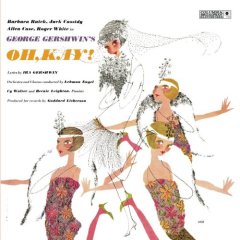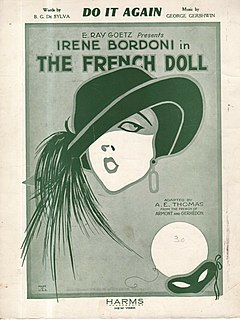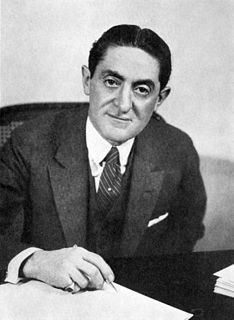
George Gershwin was an American pianist and composer, whose compositions spanned both popular and classical genres. Among his best-known works are the orchestral compositions Rhapsody in Blue (1924) and An American in Paris (1928), the songs "Swanee" (1919) and "Fascinating Rhythm" (1924), the jazz standards "Embraceable You" (1928) and "I Got Rhythm" (1930), and the opera Porgy and Bess (1935), which included the hit "Summertime".

Ira Gershwin was an American lyricist who collaborated with his younger brother, composer George Gershwin, to create some of the most memorable songs in the English language of the 20th century. With George, he wrote more than a dozen Broadway shows, featuring songs such as "I Got Rhythm", "Embraceable You", "The Man I Love" and "Someone to Watch Over Me". He was also responsible, along with DuBose Heyward, for the libretto to George's opera Porgy and Bess.

Of Thee I Sing is a musical with a score by George Gershwin, lyrics by Ira Gershwin and a book by George S. Kaufman and Morrie Ryskind. The musical lampoons American politics; the story concerns John P. Wintergreen, who runs for President of the United States on the "love" platform. When he falls in love with the sensible Mary Turner instead of Diana Devereaux, the beautiful pageant winner selected for him, he gets into political hot water.

Oh, Kay! is a musical with music by George Gershwin, lyrics by Ira Gershwin, and a book by Guy Bolton and P. G. Wodehouse. It is based on the play La Présidente by Maurice Hennequin and Pierre Veber. The plot revolves around the adventures of the Duke of Durham and his sister, Lady Kay, English bootleggers in Prohibition Era America. Kay finds herself falling in love with a man who seems unavailable. The show is remembered for its enduring song, "Someone to Watch Over Me".
Adriane Lenox is an American actress, best known for her performances in Broadway theatre. Her performance in the play Doubt: A Parable garnered her the Tony Award for Best Featured Actress in a Play in 2005. She received another Tony Award nomination for After Midnight in 2014.

The Neil Simon Theatre, originally the Alvin Theatre, is a Broadway theater at 250 West 52nd Street in the Theater District of Midtown Manhattan in New York City. Opened in 1927, the theater was designed by Herbert J. Krapp and was built for Alex A. Aarons and Vinton Freedley. The original name was an amalgamation of Aarons's and Freedley's first names; the theater was renamed for playwright Neil Simon in 1983. The Simon has 1,362 seats across two levels and is operated by the Nederlander Organization. Both the facade and the auditorium interior are New York City landmarks.

Morris "Morrie" Ryskind was an American dramatist, lyricist and writer of theatrical productions and motion pictures, who became a conservative political activist later in life.

Rob Ashford is an American stage director and choreographer. He is a Tony Award, Olivier Award, Emmy Award, Drama Desk Award, and Outer Critics Circle Award winner.

"Love Is Here to Stay" is a popular song and jazz standard composed by George Gershwin with lyrics by Ira Gershwin for the movie The Goldwyn Follies (1938).
"Isn't It a Pity?" is a song composed by George Gershwin, with lyrics by Ira Gershwin, written for the unsuccessful 1933 musical Pardon My English. It was introduced by George Givot and Josephine Huston.

Let's Face It! is a musical with music and lyrics by Cole Porter. The book by Herbert and Dorothy Fields is based on the 1925 play The Cradle Snatchers by Russell Medcraft and Norma Mitchell.

Strike Up the Band is a 1927 musical with a book by Morrie Ryskind, lyrics by Ira Gershwin and music by George Gershwin. It first ran as a satirical show in Philadelphia that year, unsuccessfully, and on Broadway in 1930 after the original book by George S. Kaufman was revised by Ryskind. The show concerned a cheese manufacturer who sponsors a war against Switzerland because it will be named after him. Much of the satire of the 1927 version was replaced in the new version by silliness, leading Ryskind to recall, "What I had to do, in a sense, was to rewrite War and Peace for the Three Stooges."

Tip-Toes is a musical with a book by Guy Bolton and Fred Thompson, lyrics by Ira Gershwin, and music by George Gershwin. It centers on a vaudeville act composed of Tip-Toes, her brother and her uncle, who try to pass her off as an aristocrat to snare a millionaire husband. Farcical complications ensue involving Tip-Toes' temporary amnesia and a marital infidelity subplot.

A Dangerous Maid is a musical with a book by Charles W. Bell, music by George Gershwin and lyrics by Ira Gershwin. The script is based on Bell's 1918 play A Dislocated Honeymoon. The story concerns an ex-showgirl who elopes with a society boy, but his family tries to break up the marriage. The Gershwins wrote ten songs for the musical, eight of which were used in the production, which premiered in Atlantic City, New Jersey, on March 21, 1921. It toured through several cities and ended in Pittsburgh, Pennsylvania, where it closed on April 16, 1921.

"Do It Again" is an American popular song by composer George Gershwin and lyricist Buddy DeSylva. The song premiered in the 1922 Broadway show The French Doll, as performed by actress Irène Bordoni.

Sam Henry Harris was a Broadway producer and theater owner.

George David Givot was a Russian-born American comedian and actor on Broadway and in vaudeville, movies, television and radio. He was known for speaking in a comedic fake Greek dialect and was styled the "Greek Ambassador of Good Will". His best known movie role may be as the voice of Tony in the Disney film Lady and the Tramp (1955).
Vinton Freedley was an American theater and television producer known for his productions of the works of Cole Porter, George Gershwin, Richard Rodgers and television shows such as Talent Jackpot and Showtime U.S.A..
Rob Fisher is an American music director, conductor, arranger and pianist. He was the founding music director and conductor of the New York City Center Encores! series from 1994 to 2005. He is the leader of the Coffee Club Orchestra, which was the house band for Garrison Keillor’s radio broadcasts from 1989 to 1993.















